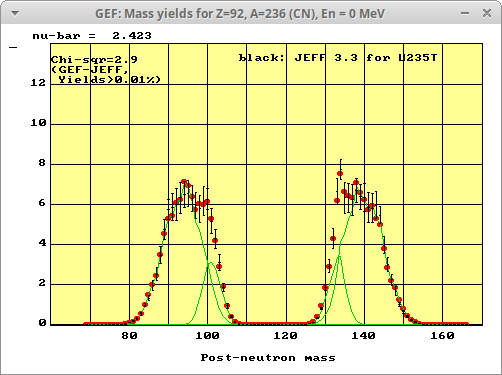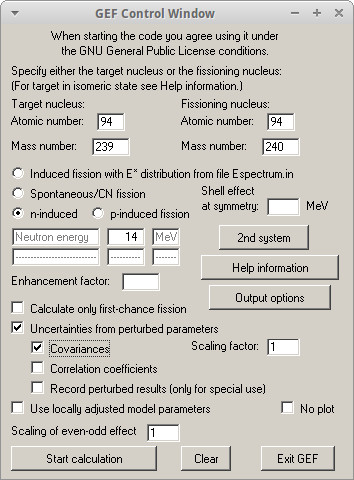GEF 2023/2.1
General
description of fission observables,
released on April 14, 2023.
Short characterisation of
GEF 2023/2.1:
Compared to GEF 2023/1.2, the description of fission yields in the
region around 226Th is revised by a modified calculation of the
macroscopic potential, a suppression of compact configurations in the
region of 230Th at low excitation energies is introduced and an
authorized extension up to Z=120 an N=200 is proposed.
GEF
2023/1.2 provides an overall improved description of fission, also in
critical regions. A further optimization of the model parameters is
underway.
The mass distribution of 235U(nth,f) from GEF-2019/1.1
(red
points) in
comparison with the JEFF 3.3 evalution (black symbols with error
bars). The calculated contributions from different
fission channels are traced in green. 10 million events have been
calculated.
An extended version of GEF-2023/2.1 that
includes delayed processes (output of delayed-neutron multiplicities,
delayed-neutron emitters, cumulative fission-fragment yields in ENDF
format) is available on demand. It provides
also an
option for producing random files of fission-fragment yields in ENDF
format.
We
are happy about any feed-back (mail to
schmidt-erzhausen<at>t_online.de). This helps to correct
errors,
to improve the quality of the model and to better respond to the needs
and preferences of the users.
Use of the GEF code is subject to the GNU GENERAL PUBLIC LICENSE
agreement that you find here: <License>.
Stand-alone version (Monte-Carlo method)
The
stand-alone version of the GEF code is written in FreeBASIC (a). The
FreeBASIC compiler produces binary code from the same source on Windows
(b) and on Linux. The executable uses the C library.
For
the Windows
version, a GUI is provided, written in JustBasic (c). The Windows
version runs also on Linux with Wine (d). The Windows version
runs also on OS X (e)
with Wine (d).
a) FreeBASIC is available from http://www.freebasic.net/
with no
cost.
b) Windows is either a registered trademark or a trademark of Microsoft
Corporation in the United States and/or other countries.
c) JustBasic is available from http://www.justbasic.com/ with no cost.
d) Wine is a windows compatibility layer for Linux and Mac OS X
(http://www.winehq.org/).
e) OS X is a trademark of Apple Inc., registered in the U.S. and other
countries.
Quick start on Windows:
- Download the binaries
(that includes some additional files).
- Start GEF.bat
in a
command window.
- Fill in the input mask of the graphical user interface and
start
the calculation.
- Output is written to file \out\...
.dat.
Quick start on Linux:,
- Download the binaries, 64-bit versions.
- Make sure that the binary file GEF is executable.
- Enter ./GEF
in a command
window.
- Answer the input dialogue.
- Output is written to file
/out/... .dat.
Windows version
Input mask
of the graphical
user interface:
For Windows and Linux
Complete
package
Documentation
Readme
file
(Technical information, list of relevant publications)
JEFF-Report
24, part I
(Comprehensive documentation of the GEF model.)
JEFF-Report
24, part II
(Technical information on the GEF code.)
Source (for Windows and Linux)
Source
files
Data
Input files for extended input options
Distribution of entrance energies (example)
List of input parameters (example)
See Readme
file
for more detailed information.
Output
Data tables in XML-assisted format (example)
List-mode file (example)
(short sample of most complete event list)
Raw data for the multi-variate distribution of fission-fragment yields
from calculations with perturbed parameters (example)
See Readme
file
for more detailed information.
You
may consider using the Windows version of GEF on Linux with Wine in
order to profit from the more comfortable input handling offered by the
graphical user interface. This option may also solve problems of
missing libraries under Linux.
Subroutine (Folding method)
The subroutine aims for being used
in combination with other nuclear-reaction codes. For a given
fissioning nucleus with excitation energy E* and angular
momentum I
it calculates complete distributions of a number of fission observables
before emission of prompt neutrons and prompt gamma radiation with the
GEF model.
Documentation
Technical description of the subroutine
FreeBASIC version
In preparation
FORTRAN version
In
preparation


